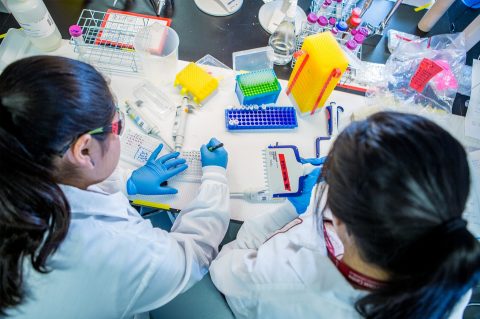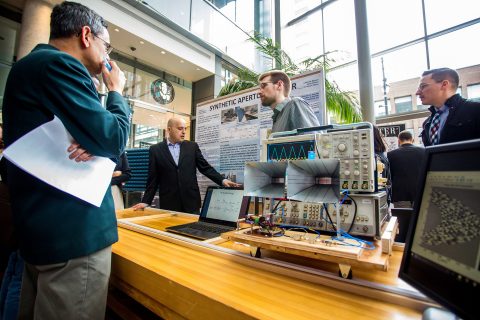Systems and Information Biology (BSc)
Virtual information sessions
Discover what makes Concordia's Faculty of Arts and Science stand out as a leader in the humanities and social and natural sciences, including academic opportunities, hands-on learning and how to achieve your goals.
Why study Systems and Information Biology?
Why does one person develop a debilitating disease early in life while another lives to be 100? How can we engineer microbes to produce new drugs or develop sustainable technologies? How can we develop better conservation strategies based on our understanding of the genetic diversity within a species?
The potential to explore these questions has exploded in our modern age of big data and data analytics. Thanks to advances in scientific and digital technologies, we can now collect vast amounts of information about biological systems, revolutionizing our ability to understand the world around us. But in order to access the insights offered by massive data sets, researchers need the language and tools of computer science.
The BSc in Systems and Information Biology will place you at the rich intersection of biology and computer science. Through lectures, labs and research projects, you will learn how to use computational and bioinformatic approaches to explore the biological sciences. Depending on your path through the program, you will learn about:
- molecular and cell biology
- computer coding and algorithms relevant to the biological sciences
- genomics and biological data sciences
- mathematics, statistics, and modelling
- ecology and evolutionary biology
Concordia’s hands-on approach provides a solid foundation for a career in the life sciences or environmental sciences, or paves the way for future graduate studies.
Students who are more interested in studying these issues with a foundation in computer science may wish to consider the BCompSc in Health and Life Sciences.
Special funding for out-of-province students
Up to $4000 for undergraduate programs.
Program structure
A Bachelor of Science degree takes a minimum of three or four years (90 – 120 credits) of full-time study, depending on your academic background.
Program options
- Honours in Systems and Information Biology (73 credits)*
- Specialization in Systems and Information Biology (61 credits)
*Honours is a highly concentrated program, ideal for students planning to continue to graduate studies. If you are interested in Honours, speak with your program advisor in your first year of study at Concordia. Students applying to the University are able to apply to the specialization.
Course requirements
Co-op program
The Co-op program gives you the chance to complete paid work terms that last 12 to 16 weeks.
Admission criteria
Minimum cut-off averages and course requirements
- Quebec CEGEP: 30 overall, 28 math, 28 science
- Natural Science DEC or
- DEC intégré en sciences, lettres et arts or
- Calculus 1 & 2; Mechanics, Electricity and Magnetism; Waves, Optics and Modern Physics; General Chemistry; Chemistry of Solutions and General Biology.
- Additional information for CEGEP applicants
- High School: A- overall, A- in math / sciences
- Canadian curricula course requirements
- Accepted international qualifications
- Completed courses in the disciplines of Calculus, Biology, Chemistry and Physics.
- ACT or SAT is not required
- AP exams are not required but may qualify you for advanced standing
- International Baccalaureate (IB) diploma: 33 overall, 5 HL or 6 SL math, 6 HL science
- one math (Applications and Interpretations HL, Analysis and Approaches HL or Analysis and Approaches SL)
- one science (Physics, Chemistry or Biology, either SL or HL)
- one of the math or science courses must be completed at the HL level
- International Baccalaureate Career-related Programme (CP): 33 overall, 5 HL or 6 SL math, 6 HL science
- Same as International Baccalaureate Diploma Programme (DP) requirements
- Additional Career-related Programme (CP) course requirements
- Baccalauréat français: 15 overall, 15 in math / sciences
- Première: Spécialité mathématiques AND Spécialité physique-chimie
- Terminale: Spécialité mathématiques (also accepted, Spécialité Physique-Chimie AND Mathématiques Complémentaires)
- Additional information for Baccalauréat français applicants
- British system of education (GCE):
- A-levels: At least two A-level exams AB, A in math, A in science or
- AS-levels: At least 4 AS-level exams with equivalent results or
- BTEC: Level 3 Diploma or Extended Diploma in a related subject area with equivalent results
- Students without math or science A-levels may be admissible based on AS-level or iGCSE/GCSE/O-Level exam results. Students should include all their exam results from iGCSE (or equivalent) onwards to support their application.
- Additional information for British System of Education (GCE) applicants
- University transfer (internal/external): B+ overall, B+ in math / sciences
- Completed courses in the disciplines of Calculus, Biology, Chemistry and Physics
Minimum cut-off averages should be used as indicators. The cut-off data may change depending on the applicant pool. Applicants who meet the stated minimum requirements are not guaranteed admission to these programs.
Application deadlines
It’s not too late to apply
Most undergraduate programs are still accepting applications for fall 2025.

FALL ENTRY (September)
Deadline: March 1
International applicants: Apply no later than February 1 to allow time for immigration document processing. However, applying earlier is strongly recommended. Immigration processing times vary by country, and delays could prevent you from starting your studies on time.

WINTER ENTRY (January)
Deadline: November 1
International applicants: Apply no later than August 1 to allow time for immigration document processing. However, applying earlier is strongly recommended. Immigration processing times vary by country, and delays could prevent you from starting your studies on time.
We reserve the right to close admission to a program at any time after the official deadline without prior notice.
Funding note
Quebec residents who enroll in certain programs and meet the eligibility criteria may apply for funding of $2,500 per term through the Quebec Perspective Bursary (Bourse Perspective Quebec).
United States students: A U.S. Federal Student Aid-eligible version of this program is offered. This version meets all U.S. regulations (such as no co-operative education or e-courses) for eligible programs.
After your degree
The BSc in Systems and Information Biology will prepare you for a career in biotechnology, as well as for additional graduate training in health-related and life sciences, such as:
- Bioinformatics
- Systems Biology
- Biotechnology
- Medical research
- Pharmacology
Student stories

Scarlet Guy
Bachelor of Arts Honours History: Public History
Find out how Scarlet Guy discovers a world of interdisciplinary learning and community support in the Faculty of Arts and Science.
Other programs of interest

Get inspired by life. Immerse yourself in the study of life at all levels: from the edge of biochemistry through cell biology and the physiology of multicellular organisms to the interactions between organisms and their environment.
Department
Faculty

The BCompSc in Health and Life Sciences will place you at the rich intersection of computer science and biology, providing a solid foundation in computer science while giving you the additional knowledge and skills to pursue a career or further studies in the health and life sciences.
Department
Department of Computer Science and Software Engineering
Faculty

Design, code, and test software products – with the big picture in mind. Think financial software, airline ticketing systems or information databases. As a software engineer, your expertise in analog/digital signal processing, microprocessors, microwaves and fibre optics will give you the tools to tackle these challenges everyday.
Department
Department of Computer Science and Software Engineering
Faculty


